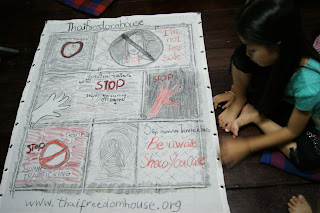 |
| Meat, noodles and sauces, Chang Mai |
I remember that warm afternoon we arrived in Bariloche in Argentina. After few minutes we met a young Dutch girl and agreed to take a taxi together to share the price. She asked where about was our hostel and we told her we were going to a hotel we had just found out from a flyer that someone had given us in the street, and we showed it to her. She barely looked at it and sort of upset but with certain arrogance she screamed a 'Oh, but I will never accept something from the street!'. Poor girl. She didn't understand that the local way was not to place an ad on the internet, but rather to advertise it on spot using simple methods. It was not a way to charge more, it was not unsafe, nor fake. In the end our deal was far better than hers. Here the local way is to eat in the streets rather than fancy pricy restaurants. Those are per definition for farangs. Taking something from a stall on the street might seem dubious and unsafe for the stomach, but appearances can be deceiving. The food is simply great, it won't attack your stomach, nor your wallet. There is a lot of choice and and a variety of good things to eat. After all, as grandma would say, if locals eat it, it means it's good!
*** *** ***
 |
| Rice sausages, Bangkok |
Mi ricordo di quel pomeriggio quando arrivammo a Bariloce in Argentina. Dopo pochi minuti abbiamo incontrato una giovane olandese con cui ci siamo accordati di prendere un taxi insieme per dividere il costo. La scena é stata questa: 'Dov'é il vostro ostello?', 'Mah, pensavamo di andare a questo hotel, guarda ci hanno appena dato un biglietto per strada vicino la stazione' e glielo facciamo vedere. Lei gli da a stento un'occhiata e tra il preoccupato e l'arrogante gridacchia un 'O, ma io non prenderei mai niente dalla strada!'. Poveretta. Non aveva ancora capito che la maniera locale non era quella di pubblicizzare le cose su internet, ma piuttosto sul posto stesso e con semplici metodi. Non era un modo per far pagare di piú alla gente, non era pericoloso, né finto. Alla fine dei conti, noi ci abbiamo guadagnato di piú andando in quell'hotel 'preso per strada'. Qui, la maniera locale é quella di mangiare su strada anziché in ristoranti cari e sistemati tutti a puntino apposta per i farang. E' come prendersi le stigliole da una griglia che cuoce in un angolo di strada o di mercato a Palermo. Sembrerà una cosa dubbia ma il prodotto in sé é buono. Qui il cibo di strada é buonissimo. Niente attacchi di mal di pancia e niente attacchi ingiustificati al portafoglio. C'é tanta varietà di roba buona e come direbbe la nonna, se lo mangiano loro vuol dire che é buono.

























